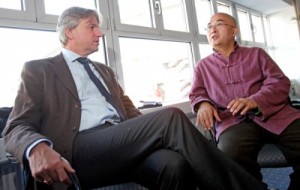November 7, 2012
The Friedenspreis winner Liao Yiwu
Liao Yiwu Frankfurt book fair 2010
Liao Yiwu, Chinese author and dissident, speaks to Juergen Boos, director of the Frankfurt Book Fair, in 2010. Photo: Alexander Heimann, Frankfurt Book Fair.
For writers and publishers in Frankfurt on the Main, October is a busy season. One October, two years ago, the 52 year-old Chinese writer Liao Yiwu left his country for the first time in his life to go to the Frankfurt Book Fair. On the train he heard the announcement that his friend Liu Xiaobo was awarded the Nobel Peace Prize. Tears ran down his checks, the joy was so overwhelming. This year the situation was repeated: He received news, on the train to Frankfurt, that his colleague Mo Yan had become the new Nobel laureate for literature. Instead of joyous tears, Liao was dumbstruck. He totally disagreed with the decision. For him Mo Yan belongs to the Party establishment. Should Mo Yan come to the Frankfurt Book Fair again, Liao doesn’t want to meet with him. Liao Yiwu is in harmony with his new Western life. Since last summer he has lived in Berlin, bathed in prizes and honor. His books are published in German, English, French, Polish, and Portugese. He’s this year’s Friedenspreis winner of the German Book Trade.
Many big names have been on the prestigious Friedenspreis winners list: Albert Schweizer, Hermann Hesse, Vaclav Havel, Jürgen Habermas, Susan Sontag etc. Liao is the first Chinese writer to stand on this queue of international prominence. Conscious of his historical role, Liao made a general review of the Chinese regime in his acceptance speech on October 14th at St. Paul’s Cathedral, entitled “The Empire Must Fall Apart.” The title alone was eye-catching. Liao’s speech started with the death of a nine year-old boy during the Tiananmen massacre and traced back over two thousand years of Chinese history. In ancient China the country was divided into dozens of states and civilization was flourishing through the decentralized status quo. Even the tyrannical “First Emperor of Qin” (259-210 BC), who burned books and buried 460 intellectuals alive, could not compete with Mao Zedong. The latter was proud that the CCP had purged hundreds of thousands of “counter-revolutionary” intellectuals, thousands times more than the First Emperor. Because of the 40 million dead under the regime, the suppression of dissenters, religious people, peasants, workers, lawyers, and Tibetans, Liao denounced the legitimacy of the “blood-stained empire” and called China a “source of global disasters” and an “ever-expanding garbage dump.” At the same time he harshly criticized western companies which, through their business, have become accomplices in destroying and polluting the environment, and extending the life of the monstrous empire.
Seldom has someone who stands in the spotlight of Western society spoken out so unmistakably on the reality in China, pointing the finger at the perpetrator—the ruling party of the CCP. After Liao’s speech, the official Chinese newspaper Global Times published an article saying: “The speech makes some people doubt his judgment and the ability to control his own emotions. It’s surprising that Germany picks such a bigoted person as the award winner. Shouldn’t those attending the ceremony, including German President Joachim Gauck, blush for Liao’s hysterical speech?” Furthermore the article’s author calls the exiled Chinese dissidents “losers in each society.” The next day the newspaper published a comment from Mr. Kong Qingdaong, professor at the Chinese Department of Peking University. He wrote: “People have the freedom to be schizophrenic.”
For detail please visit here

